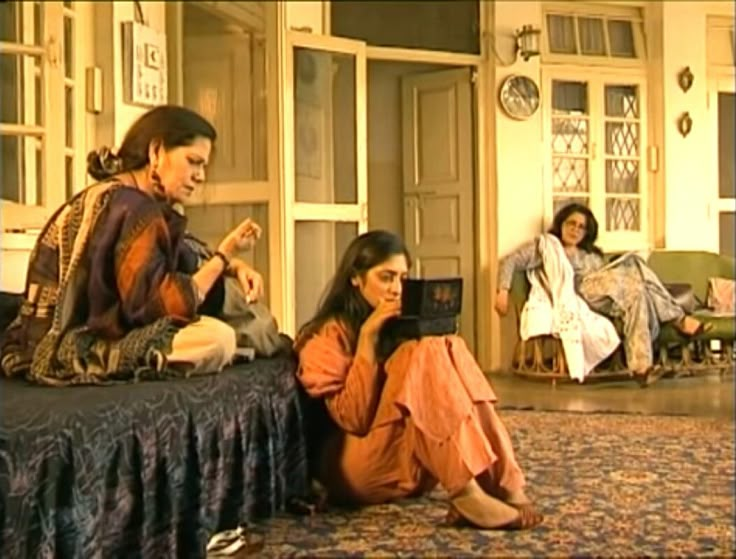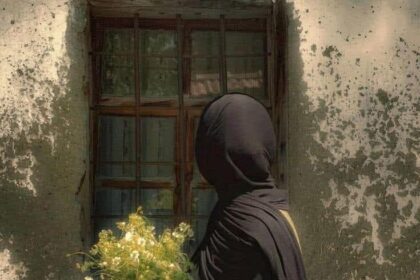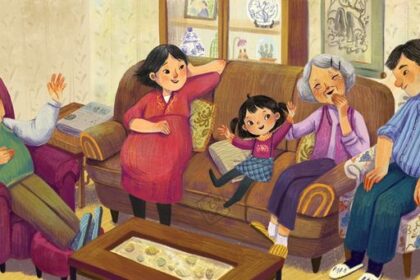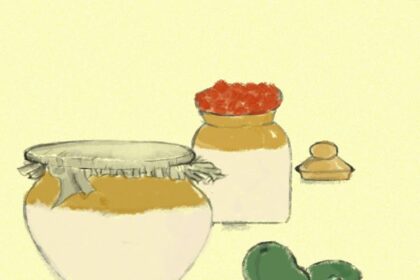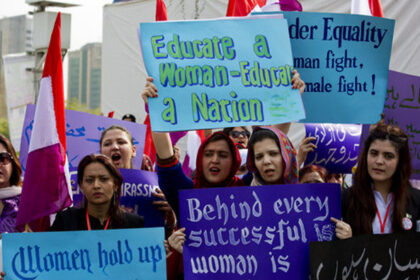I’ve been told most writers have narcissistic tendencies. So, this piece is not about women. It’s not about women. It’s purely about my mothers’. My woman, and most of all, it is about me.
Mothers are the basic building blocks of society, even if I put all my feminist opinions aside. Logically, nobody can deny that, without women, the world would cease to exist. However, I must acknowledge that more often logic goes out of the window when we’re talking about women.
Just like every other story, mine starts with a stream of women. It features the mothers of my life: my nani and my mom. The fact that I started writing this on Women’s Day is revealing—but that was just a coincidence. I can’t take credit for how the stars aligned, but it sure helps with the poetry behind my piece. This essay chronicles how I am at the centre of the lives these women led and how they are, have been, and will be at the centre of mine.
Now how am I supposed to start the story without the pioneer—my Nani? This piece was initially supposed to be solely about her, but people do not exist in a vacuum—especially a woman like her. Especially considering I exclusively spent the ages of five to ten considering my Nani’s house as my sanctuary.
The marble floors that were basically made to slide around wearing socks. The rough, scrappy textured walls that were eventually stained with my blood when I hit my head against them. The sound of footsteps running toward me from the kitchen and the slip into Memoni from Urdu because of the worry. The smell of food in my Nani’s clothes as she scoops me up in her arms. The taste of the candy from the shop around the corner was offered in an attempt to comfort me. The walls that were eventually covered with wallpaper in fear that kids in the future would also bust their heads open on them.
My Nani shaped my identity in so many ways I cannot even recall, but there are many instances etched into my existence. The bedtime stories always had the same characters named Ayesha, with black hair and brown eyes. The stories that always came with a moral lesson—whether about a girl who didn’t listen to her elders and learnt her lesson, or a princess who realised the importance of not lying, or a fairy that had to be careful not to bang her head on walls while flying around.
My aversion to eggs is something I completely blame on my Nani—the smell of fried eggs in asli ghee continues to haunt my senses even at twenty-one. The bites she stuffed into my mouth, slowly shifting into bites made on a steel plate for me to eat by myself, eventually turned into not eating anything at all for breakfast.
I could sit here and question what happened in this time. But I know the answer: I grew up—and got closer to my mother. I made the trade-off without realising. I chose my Nani when I was a child, before knowing who my mother was. I let the disconnect I had with my mother override the broken relationship she had with her own mother. I began to see my Nani through my mother’s lens. She wasn’t simply my Naninow. She became my mother’s mother. I could no longer excuse her actions or her responsibility for falling short with her own daughter.
I grew up with an understanding of the world that was different from hers—one she wouldn’t approve of. Yet she was the first person to pat me on the back, to give me words of encouragement, when I moved to Lahore to pursue a degree that meant something to me.
Now, I guess my mamoo was right—I will always stand apart. I will always be her exception. And she will always get a hall pass for being who she is. The relationship between her and my mom will always be a point of contention for me. I can’t shake that, because that is the least I can do for my mother.
However, Nani’s place in my life will forever be unmatched because she did for me all the things I hear my friends’ desi moms did for them—forcing me to the floor to oil my hair so much it took multiple shampoo cycles to get it out, sitting with me as I struggled to spell S-H-R-I-M-P for my creative writing story, and trying to keep me focused as I got distracted spinning on the squishy swivel chair.
One thing I always feel guilty about is how, when I hear someone has lost a grandparent, I always think of her—how it would crush me. But what kind of person thinks like this in someone else’s grief?
Instead, I think about how much I wish I could force her to change her opinions or how much her support would mean to her daughter. But it’s not my place. It’s not my job to repair my mother’s relationship with her mother. That would be like purposely hitting my head on those textured walls.
“Did mothers always try to press unto their daughters the itineraries of which they themselves had dreamed?” – Joan Didion
I am simply unable to chronicle my relationship with my mother without this quote. When I read it for the first time—my phone light the only thing illuminating the dark room—it was as if my entire relationship with my mother had been cracked open. That’s what my Nani chose to do for my mom: push her to do what she had dreamed of, unaware of the resentment that piled up within her.
It’s strange how generational trauma manifests itself. My mother, solely in rebellion, chose the opposite. Her expressions of expectations were always stunted—perhaps from an internalised fear that she would, like her mother, force her dreams onto me.
However, in a relationship like that, how can dreams not seep into one another?
My mother couldn’t suppress the wonder when she sat with me in the too-small plastic chairs, staring at a whiteboard that said Welcome, Batch of 2021 in blue and green ink. I felt the happiness radiating off her when I got into the same school whose application form she had once collected but never submitted.
Just like that happiness, the disappointment was deafening when I turned down the offer from her dream university. But never a word was uttered. When I mentioned to her on one of our daily phone calls that I was writing an essay about her and Nani, she replied, “Acha, female role models pe likh rahi ho.”
As much as I want to see her as this unconventional mother, she says things like this and ruins the image I’ve built for her in my mind. But perhaps it’s my own need to classify my mother into a certain box. Sometimes, as a daughter, I forget that she is also human.
One thing I can say for sure, though, is that being close to her means I know her as well as she knows me—in some instances, even more. The only difference is she doesn’t realise how well I know her. Every small wrinkle on her face—I know where it comes from. The grainy, lagging LUMS (Lahore University of Management and Sciences) Wi-Fi video call is enough for me to know she’s upset. That’s one of my favourite things about us—but also the reason for my frustrations.
Despite the risk of sounding cliché, it’s the people that love you the most who can hurt you the worst. There have been countless moments when my mother has said things—words I carry with me every day, every second. In her anger, she has said things I know she didn’t mean. Things she feels guilty for. But I can’t help but hold her accountable. But I am my mother’s daughter. I’m sure I must have done the same.
Time is a strange thing. It changes people in ways you never thought possible. My mother powered through everything. When I almost burnt my skin off by pulling down an iron, she simply sighed, put my hand under cold water, and scolded me for playing too close to the table.
Yet fourteen years later, when my brother fell off a stool—blood rushing out of his nose—I saw the quiver in her hands, the tears in her eyes, and the panic she couldn’t hide. I asked her about it. She said she had lost her nerve (“Ab nahi hota meray se.”)
It seems like her reservoir of bravery has run dry—or perhaps she thinks this way. It was jarring to see a woman who had fought through loss and grief with so much strength now faltering at a nosebleed. It was jarring to know that this woman was my mother. Always so collected. Now so human. All my life, I wanted to be her, instead of the contrasting emotional mess I am. Now what?
Never did I think she would need to wear those enormous sunglasses when she dropped me off at my dorm for the first time. Time is an amazing thing. It changes everything. But maybe it’s I who has changed. Maybe now I notice the shaking hands and the sunglasses.
Writing about my mom feels like a trap. I want to vomit every cliché about mothers onto the page because I connect with them—because she is my best person. Everything I am can be traced back to her. My math tuition teacher once told me, jokingly, You talk about your mom so much, I feel like I don’t even have to meet her.” I was embarrassed. I saw it as a sign to talk less about her.
Even today, I pace out my stories about her—this throbbing worry that people will think the same. I am ashamed of that. The guilt eats me up inside—that I feel shame for the person I should be most proud of.
She deserves better.
My mother once told me in the middle of one of our frequent shouting matches, “You think I’m the villain in your life.”How do I tell her that instead of the devil and angel on each shoulder, I have versions of her, constantly making me question everything I do?
My struggle is with her—or with myself.
I always say I love everyone as much as my pinky nail. The rest of my love is reserved for her. The strange thing about all this is that I never thought I would write about them.
To me, writing things that show family members in a not-so-flattering light felt like a betrayal. The notion that others shouldn’t know what happens behind closed doors—it took so much from me.
It took time. It took time to realise I could never talk about myself without talking about the people who made me. The lineage of women I come from. I will always fear—like all women do—that I will turn into my mother. For me, that fear is also eclipsed by maybe turning into my Nani.
These are the women I am closest to. Yet I could not be more different from them. There is a certain paradox in these relationships: you cannot imagine life without them, and yet they are also the example of who you should not become.
They raised me to not be a version of them solely. But to be them – yet better. What does that even mean? When is better the best?
One day, when I have a daughter, I will give her more—expecting her to be better. But will there ever come a day when the best woman is made? Operating under this mindset takes away our humanity—as if we are just robots, each generation an upgrade. I would argue these women—with all their flaws—became the best of what they could be, with what they were given.
The day I fear the most is when women stop connecting, when mothers stop being fodder for their daughters’ writing. The entanglement of these relationships is what makes them so unique, so special. The complexity of emotions I feel when I look at my Nani or my mom is so specific to them—because of how deeply entangled my life is with theirs.






